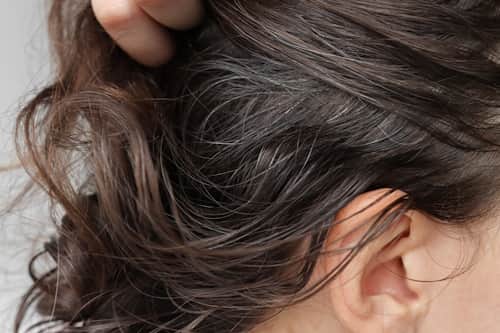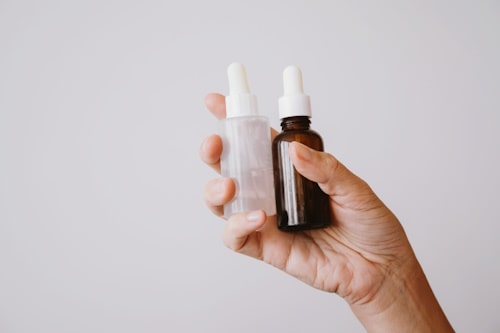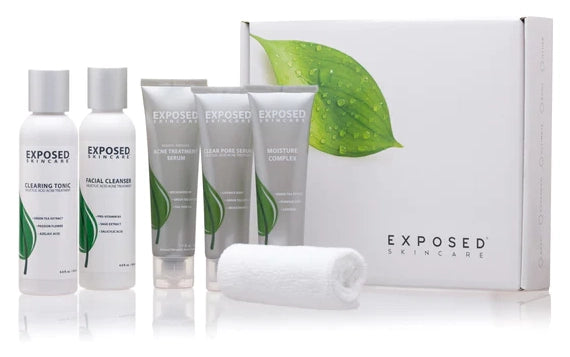Scalp acne can be both painful and embarrassing. Unlike acne on other parts of your body, pimples on your scalp are hidden under your hair, making them harder to treat.
Fortunately, there are home remedies for scalp acne that can help you. This comprehensive guide explores five effective ways to treat scalp pimples, ensuring you maintain a healthy scalp and beautiful hair.
Also read: How to choose the best acne treatment
Biggest Take-Aways:
- Regular scalp hygiene and the right choice of hair products are crucial in preventing and treating scalp acne.
- Natural remedies, like tea tree oil and apple cider vinegar, can effectively manage mild cases of scalp acne.
- If left untreated, severe scalp acne can cause inflammation and potentially lead to hair loss.
- Exposed Skin Care is a beneficial treatment for scalp acne, addressing the root causes while being gentle on the scalp.

What Causes Scalp Acne?
Acne on your scalp, also known as scalp folliculitis, occurs when hair follicles become clogged with oil, dead skin cells, and sometimes bacteria.
If not addressed properly, this can cause pimples, cystic acne, or even hair loss. Factors such as excess oil production by sebaceous glands, buildup of hair products, and inadequate hair and scalp hygiene can exacerbate the condition.
Remedy 1: Tea Tree Oil: Nature's Antiseptic for Scalp Treatment
Why Tea Tree Oil?
- Natural Antiseptic Properties: Tea tree oil is renowned for fighting bacteria and reducing inflammation, making it an excellent choice for treating scalp acne.
- Regulating Oil Production: It helps regulate sebum production, thereby addressing one of the root causes of scalp acne.
How to Use Tea Tree Oil for Scalp Acne
- Direct Application: Mix a few drops of tea tree oil with a carrier oil like coconut oil and apply it directly onto your scalp. Leave it on for a few hours or overnight before washing your hair with a gentle shampoo.
- Tea Tree Oil Shampoo: Alternatively, use a shampoo that contains tea tree oil to keep your scalp clean and prevent future breakouts regularly.

Remedy 2: Apple Cider Vinegar: Balancing Scalp pH
The Benefits of Apple Cider Vinegar
- Balancing Scalp pH: Apple cider vinegar can help balance the pH level of your scalp, making it harder for bacteria to thrive.
- Exfoliating Dead Skin Cells: It acts as a natural exfoliant, helping to remove dead skin cells and prevent clogged follicles.
Application Method
- Scalp Rinse: After washing your hair, rinse your scalp with a mixture of apple cider vinegar and water. Let it sit for a few minutes before rinsing off with cool water.
Remedy 3: Salicylic Acid: The Deep Cleanser
Why Salicylic Acid?
- Unclogging Pores: Salicylic acid is effective in treating acne due to its ability to penetrate and cleanse clogged hair follicles.
- Exfoliating Agent: It works as an exfoliant to remove excess oil and dead skin cells, preventing the formation of pimples.
Using Salicylic Acid for Scalp Acne
- Salicylic Acid Shampoo: Use a shampoo formulated with salicylic acid, focusing on areas with breakouts. Be mindful to use it as directed, as overuse can cause scalp irritation.

Remedy 4: Aloe Vera: Soothing and Healing
The Healing Properties of Aloe Vera
- Soothing Irritation: Aloe vera is known for its soothing properties, which can calm an irritated scalp.
- Natural Moisturizer: It provides hydration without adding excess oil, crucial for maintaining a healthy scalp environment.
How to Apply Aloe Vera
- Direct Scalp Application: Apply fresh aloe vera gel directly to the scalp and let it sit for about 30 minutes before washing it. This can be done several times a week for the best results.
Remedy 5: Maintain Good Hair and Scalp Hygiene
Keeping Your Scalp Clean
- Wash Your Hair Regularly: Regularly washing your hair helps to remove excess oil and dead skin cells that can cause scalp acne.
- Choose the Right Hair Products: Opt for non-comedogenic hair care products that won't clog pores or hair follicles.
Tips for Healthy Scalp Hygiene
- Avoid Over-Washing: Washing your hair too frequently can strip it of natural oils, increasing oil production.
- Gentle Hair Care: Be gentle when styling your hair. Avoid tight hairstyles that can cause scalp irritation.
Additional Tips for Managing Scalp Acne
- Avoid Popping Pimples: Popping pimples on your scalp can lead to further inflammation, infection, and even hair loss.
- Eat a Balanced Diet: A healthy diet can help regulate oil production and reduce the likelihood of acne breakouts.
- Stay Hydrated: Drinking plenty of water helps maintain overall skin health, including the scalp.
- Reduce Stress: High-stress levels can worsen acne, so managing stress is important for your scalp health.
Using Exposed Skin Care for Effective Scalp Acne Management
Exposed Skin Care is a comprehensive solution designed to tackle various types of acne, including the common skin condition of acne vulgaris, which can often be the underlying cause of pimples on the scalp.
Here's how it stands out as an effective treatment for scalp acne:
- Targeted Acne Treatment: Exposed Skin Care products are formulated to address the issues that cause acne, making them an ideal choice for managing scalp acne.
- Gentle on Hair and Scalp: Unlike some harsh acne treatments, these products are designed to be gentle on your hair and scalp, minimizing the risk of damage caused by aggressive hair styling products.
- Prevents New Breakouts: Regular use helps treat existing pimples on the scalp and prevent future breakouts, thus maintaining a healthier scalp environment.
- Addresses Multiple Factors: It targets multiple factors that cause acne, including the buildup of dead skin cells, excess oil, and bacteria.
Incorporating Exposed Skin Care into your hair care routine can significantly improve the health of your scalp. Remember, a good acne treatment routine is crucial for keeping your skin and scalp in optimal condition.
Conclusion
Scalp acne is a condition that can cause significant discomfort and affect one's self-esteem. Understanding the best ways to treat and prevent scalp acne is crucial for anyone suffering from this common skin issue.
The key is identifying scalp acne early and adopting a routine that addresses the root causes, such as oil on the scalp and dead skin cells clogging scalp hair follicles. The importance of preventing pimples on your scalp cannot be overstated.
Regular care and the right treatments can significantly reduce scalp breakouts and the symptoms of scalp acne. Home remedies can be particularly effective for those experiencing mild to moderate acne.
However, it's essential to remember that acne can develop into more severe forms if not managed properly. Taking care of your scalp involves a delicate balance. Harsh treatments can worsen acne, leading to more severe breakouts on your scalp.
It's about finding what works for you, including natural remedies or products like Exposed Skin Care, known for its efficacy in treating and preventing scalp acne.
For individuals who struggle with acne persisting on their scalp or hairline, exploring different methods to treat and reduce scalp acne is vital. Remember, consistent and gentle care is the key to managing scalp acne and preventing future issues that could lead to hair loss.
In conclusion, whether you're trying to treat pimples on your scalp or prevent new ones from forming, understanding your scalp's needs and responding appropriately is essential. With the right approach, you can manage scalp acne effectively and maintain a healthy, confident appearance.
FAQs
What Causes Pimples on the Scalp?
Clogged hair follicles primarily cause pimples on the scalp due to excess oil, dead skin cells, and sometimes bacteria.
Can Hair Products Cause Scalp Acne?
Yes, certain hair products can clog pores and lead to scalp acne, especially if they contain comedogenic ingredients.
How Often Should I Wash My Hair to Prevent Scalp Acne?
It's recommended to wash your hair regularly, but not excessively, to remove oil and dead skin cells without over-drying the scalp.
Are Natural Remedies Effective for Treating Scalp Acne?
Natural remedies like tea tree oil and apple cider vinegar can effectively treat mild scalp acne and maintain scalp health.
Can Scalp Acne Lead to Hair Loss?
Severe or untreated scalp acne can lead to inflammation and infection, which may eventually cause hair loss.
Is Exposed Skin Care Good for Scalp Acne?
Yes, Exposed Skin Care can effectively treat scalp acne by targeting the factors that cause acne without being harsh on the scalp or hair.
















